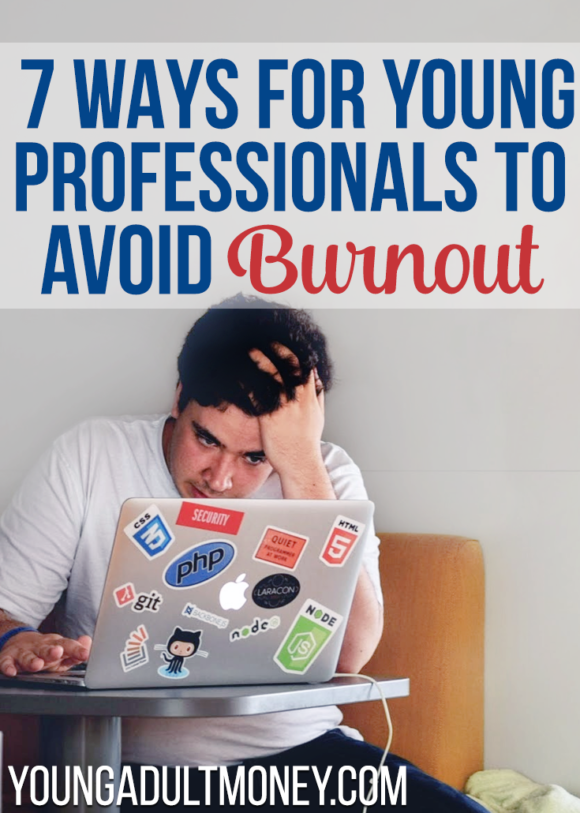 Most young professionals work hard – very hard.
Most young professionals work hard – very hard.
We’re eager to prove ourselves, to move up in the company or better our craft, but this comes at a cost.
Usually this cost is stress and while stress itself is neither uncommon nor necessarily a bad thing for your work, prolonged periods of intense stress can lay the foundation for burnout, which is a bad thing.
Suffering from burnout can place metal limits on what we’re able to achieve at work while destroying relationships with colleagues and family. It’s important for young professionals to both be aware of burnout and understand how to avoid it.
1) Identify the Symptoms
One of the strengths of being young is our energy – we can pack our schedules with both work and play, burning the candle at both ends, only needing a cup of coffee – or five – along the way to keep us buzzing.
But strengths are often weaknesses too, and the weakness of pushing ourselves to far is that we end up burning out – sometimes without even realizing what that is.
The first step to avoiding burnout is to be aware of it and to realize that even young professionals can be vulnerable to it.
It’s important to understand that burnout is different from stress (here’s a great article on the differences), but the essential difference is attitude; with stress you will feel a range of emotions, good and bad, but with burnout you will mostly feel apathy towards work, life, and even loved ones.
If you start becoming cynical and apathetic towards work you previously felt passionately about, then these are two strong signs you’re about to burnout.
2) Start Saying No
Being busy is a natural state for most young professionals and, let’s be honest, though we might complain about it, being busy often feels good. Being busy allows us to feel in control, helps us forget insecurities or problems, and gives us a feeling of purpose.
It’s a good thing, too. Working hard – very hard – is a staple of our culture and a reason we have the amount of opportunities we do, but it can become dangerous when it becomes an addiction that we can’t say no to.
If you’re feeling the onsets of burnout, then being constantly busy is something you’re going to have to tackle.
You’re going to have to learn to say “no” to new opportunities, even good ones, and maybe even reduce your prior commitments as well. The good feelings – the feelings of worth and control – that being busy brings need to come second to our physical and mental health.
It may feel strange at first, but if you feel the onsets of burnout, then you need to working yourself so hard. The solution is to start saying “no,” and stop feeling bad about saying it.
3) Begin As You Mean To Go On
I’ve heard it said that successful people start their days as they mean to go on.
So if you wake up late and are scrambling around, then the tone you’re setting is chaotic. Likewise, if you get up in plenty of time – with time to read or think or meditate before the day begins – then you’re setting a tone for yourself that’s peaceful and in control.
Unsurprisingly, this is also a strategy for avoiding burnout.
Try taking ten or fifteen minutes at the start of your day to switch off your phone and shut your laptop. Instead, do something you enjoy – reading for pleasure, journaling, or maybe taking the time to cook a decent breakfast.
Think of it as a mental detox first thing in the morning. By doing so, even just for ten minutes, you’re taking control of your life while relieving the stress by reminding yourself that work isn’t so important that you will let it rule your life.
4) Prioritize Your Physical Health
Being young is not the same as being invincible, even though it may seem that way at times. If you aren’t treating your body right, it will eventually catch up to you.
A simple way to avoid burnout is to start following expert advice on how you should treat your body: get seven to eight hours of sleep a night, exercise regularly, and eat healthily.
These are things we all know we should be doing but often aren’t. Whether you need to start setting yourself some goals or just work on gathering some motivation, these are areas that need to be priorities in order to maximize our working lives.
5) Get Creative
Creativity isn’t just for the artsy types, and it doesn’t mean you have to draw a picture about your feelings or write some bad poetry.
Getting creative could be simple as taking up a hobby, writing the book you’ve meant to write, or getting outside for a hike – give yourself an outlet, and not necessarily one that helps your career or work: something for you.
The point of finding a creative outlet is to give you space in your life – burnout comes from exhaustion and feelings of being trapped, creativity is freeing and a powerful remedy to those suffocating feelings.
6) Work on Your Self-Efficacy
Self-efficacy is your own faith in your ability to achieve what you set out to do. If you’re the type of person who regularly accomplishes their goals, then you’re likely to be someone with high self-efficacy.
The advantage of this when it comes to burnout is that people with high self-efficacy aren’t as susceptible to stress, simply because they are confident in their ability to get their projects done.
They will still experience stress, like anyone else, except they won’t spend every hour of the day worrying about their work, like someone with lower self-efficacy will.
So how to you improve your self-efficacy? By setting yourself goals and achieving them.
Start small and set goals you’re sure you can achieve, and then progress to harder things. Greater self-efficacy will reduce your stress levels by giving you the confidence to know you’ll get things done, even if you aren’t quite sure how!
7) Take a Break – a Real One
If you really feel like you’re on the edge between stress and burning out, then the best solution may be to just get away from it all. If you haven’t taken an actual vacation in years, then a three day weekend probably isn’t going to cut it.
Book a vacation, take some real time off. Recharging and acquiring some perspective is sometimes the only way to really tackle the deeper issues of stress and burnout. It’s standard advice, but it’s also good advice: take a break – a real one.
_____________
Just by being aware of burnout and respecting the affect it can have on our careers and lives is an important step to beating it. If you know the warning signs and can feel the onsets of burnout coming, then be smart, swallow your pride, and start taking the steps to avoid it.


Great article! In line with points four and five, when I was getting burned out in my previous position, I started ski instructing on the weekends. Getting outside, doing something I loved, getting some exercise, and interacting with students really helped me decompress on the weekends and return each week to the corporate world with a fresh outlook/attitude (and it didn’t hurt that I was earning money at the same time!).
Saying no has helped me keep my sanity. There are a lot of opportunities coming up for me. I wish I could do all of them, but I can’t. By saying no to some of them I’ve been able to focus on other things.
This is a great post. What I find that are really helpful to me is saying no and taking a break. Often times, saying no is a sign of weakness or unwilling to help others. This may be true but I always believe that you should always take care of yourself so you can take care of others. If you are constantly helping others that you don’t find enough time to yourself, then, you will give up later on. This goes to taking a break.
I believe that no matter how life becomes busy, people need to take a break from what they are doing. It is by taking breaks that you become re-energize and feel stronger. What I always do is I take 30 minutes of my time a day dedicated to working out. This helps my mind away from work.
Great suggestions. Knowing when to speed up, slow down, or otherwise change gears is a significant factor in achieving – and maintaining – success.
Great post!
One thing I have realized is that at least for my industry, working hard does not lead to success.
I find that when I force myself to care less about work, I end up being much happier, and even performing better.
When I start internalizing work and letting it get to me, I get stressed and angry.
When I remind myself that it is irrelevant in the grand scheme of things, I become much happier.
Thanks for the great tips!
I was once deeply stressed out from work and what I found really useful is by working out and sweating the stress out. I started jogging and each time after a good jog I’d feel refreshed and optimistic again.
Saying no and prioritizing physical health have definitely helped me early on in my career. I had to turn down some great opportunities early on in my career because I simply needed time for myself. Focusing on yourself is the key to happiness.
There is an art to being able to successfully say no and is a must to control your finite time. Also cannot say enough about the importance of staying healthy, its usually one of the first things neglected as we get busier but so important to being able to maintain an optimal level of productivity.